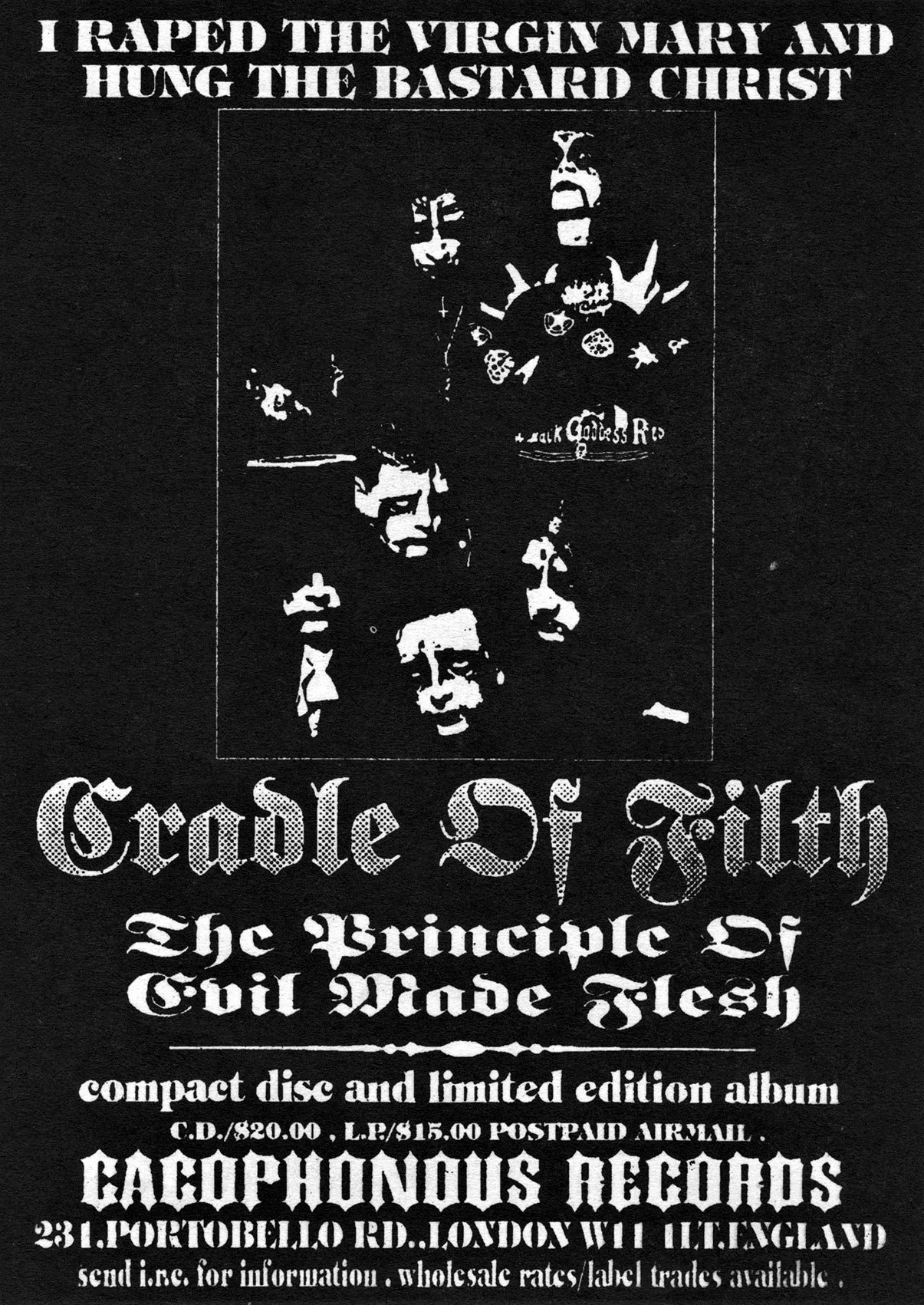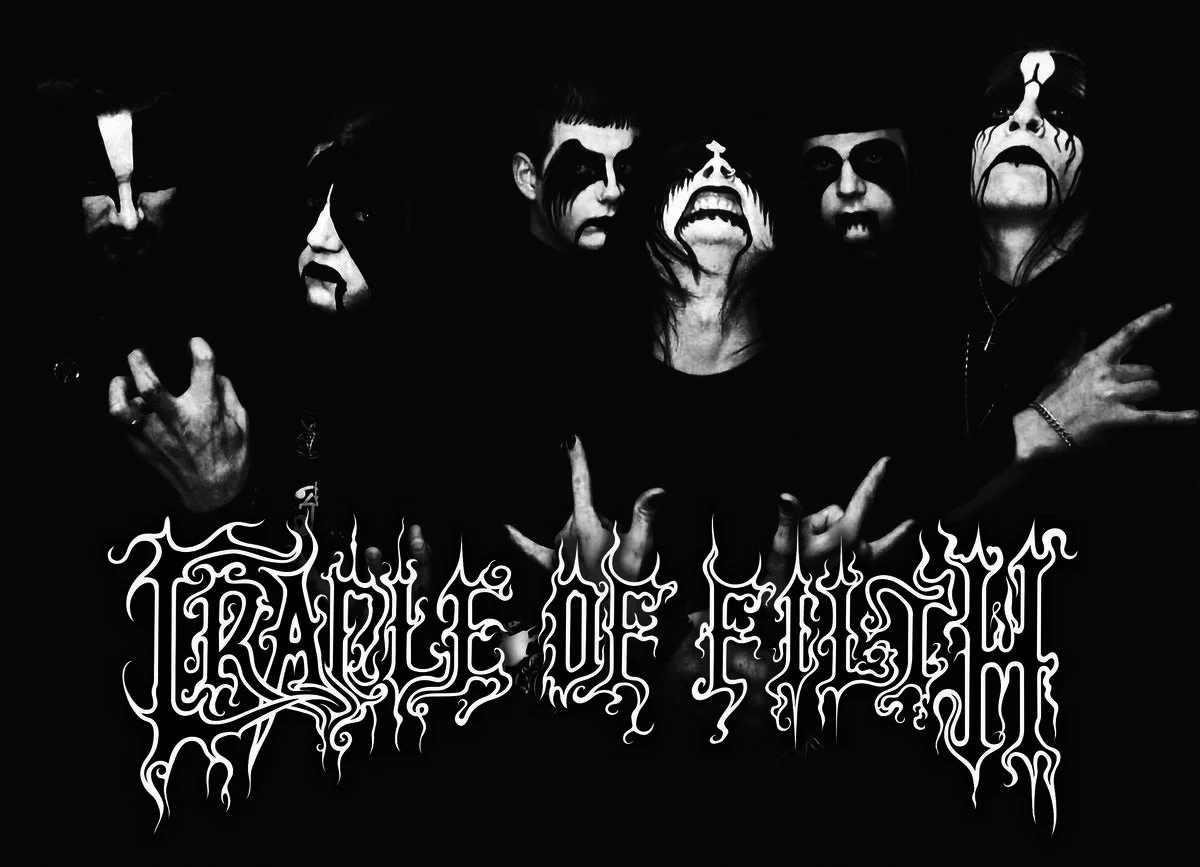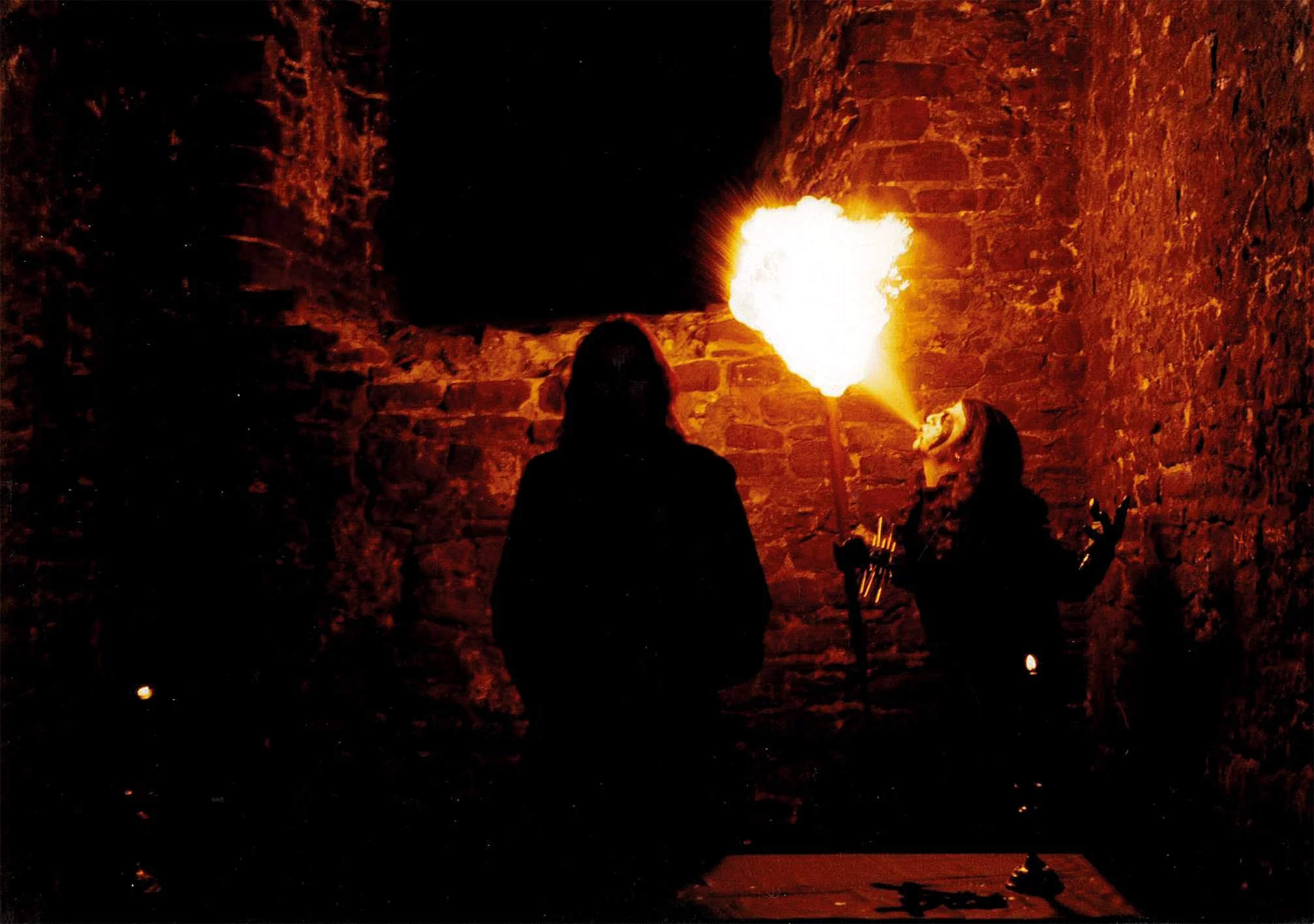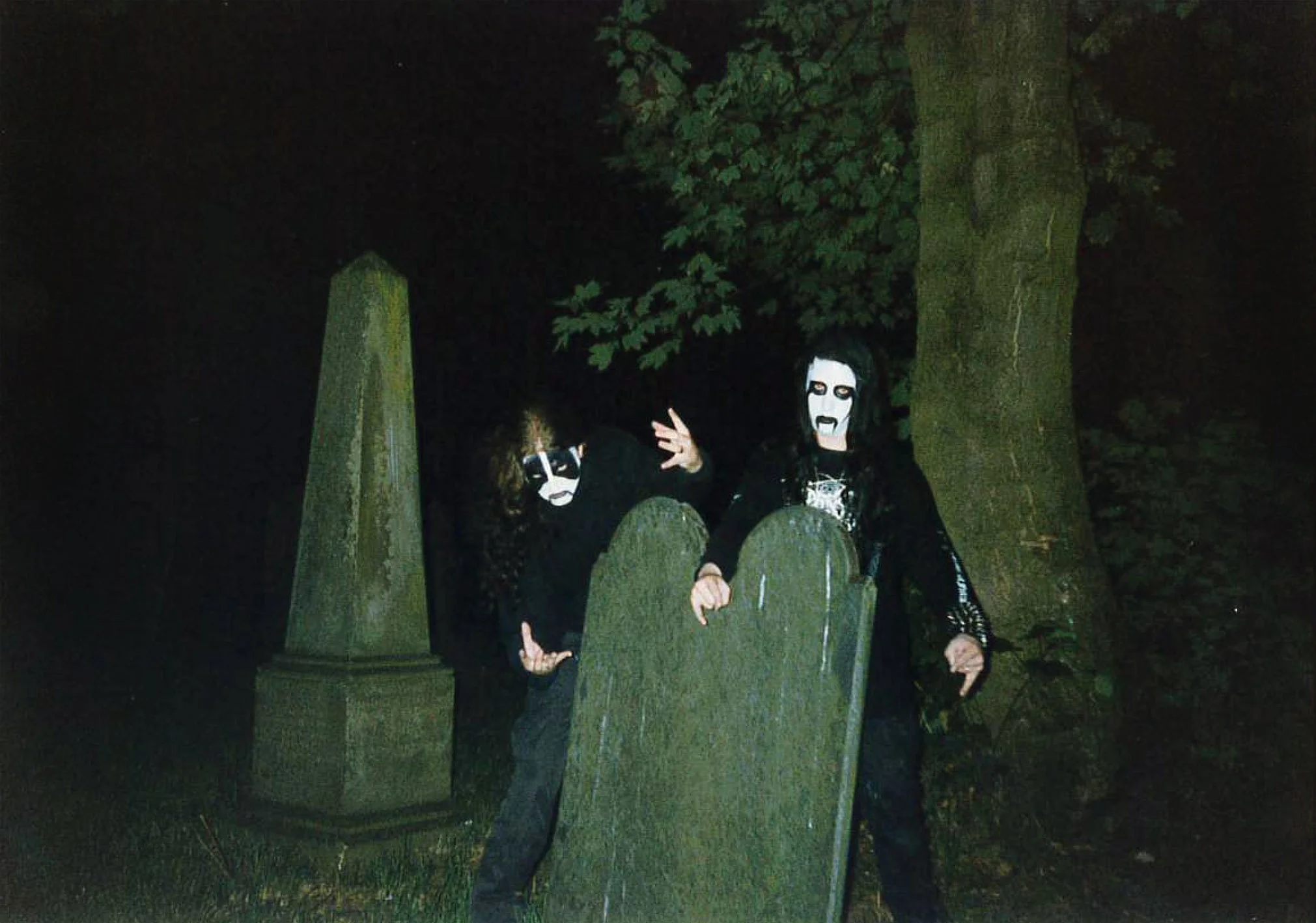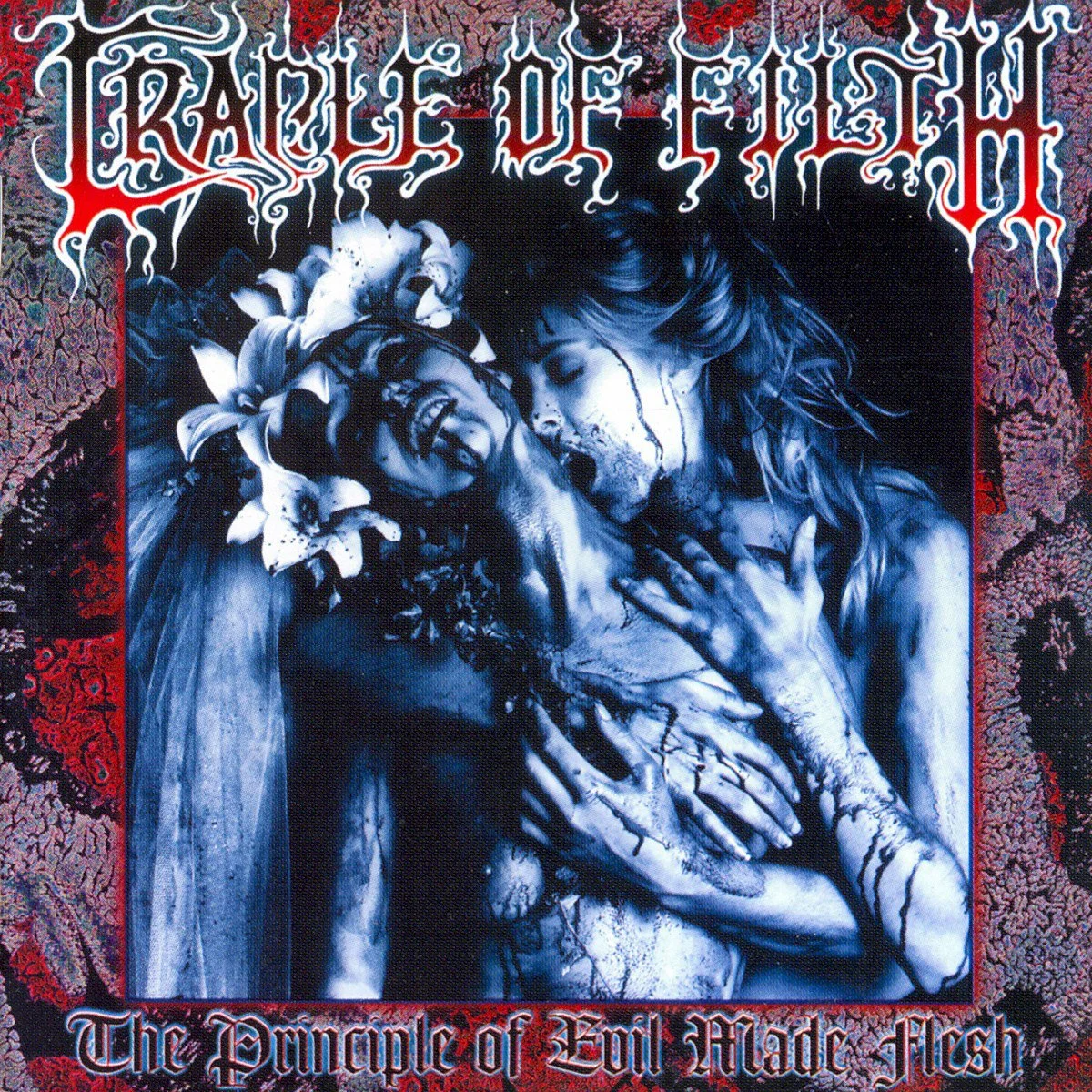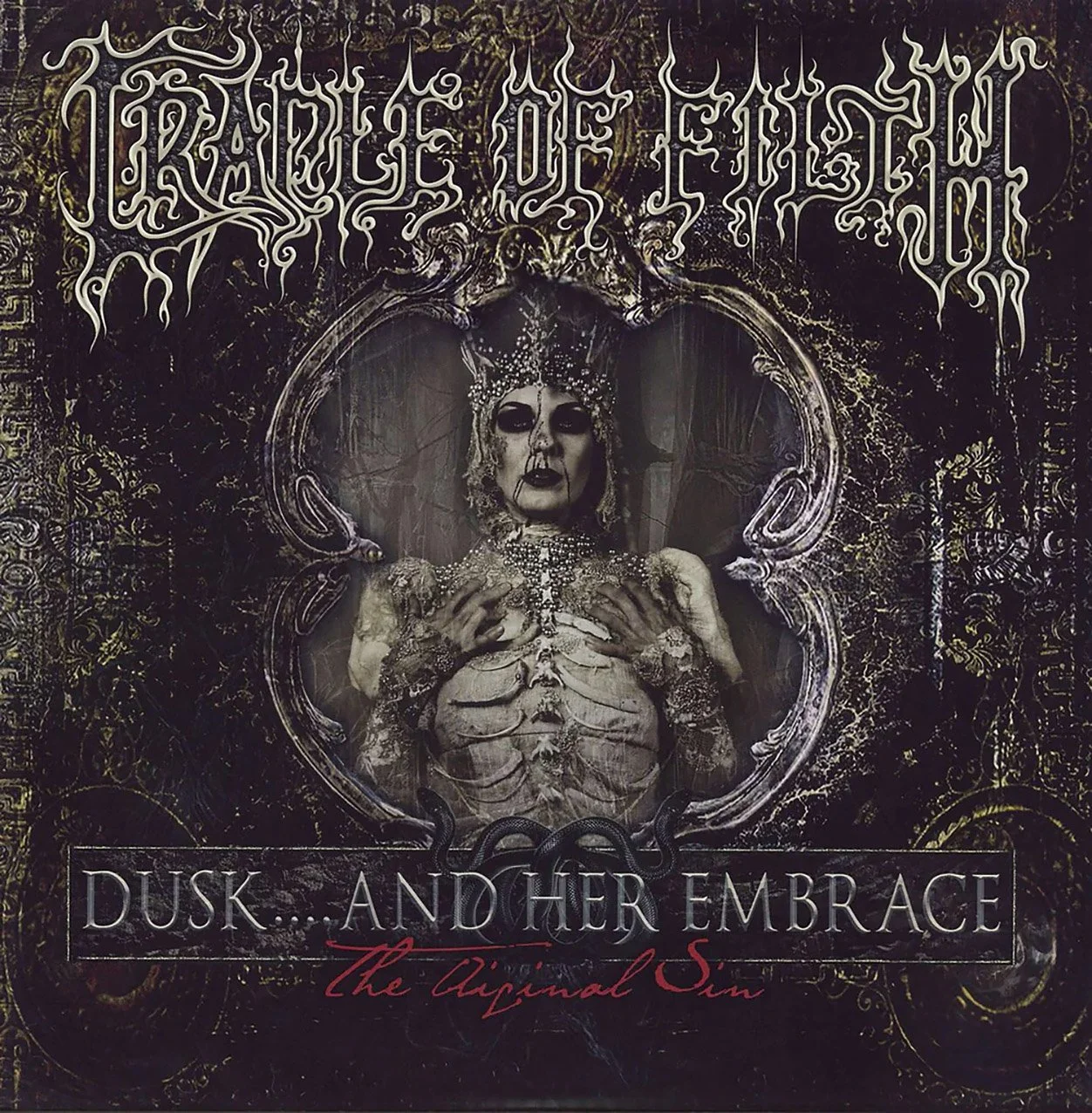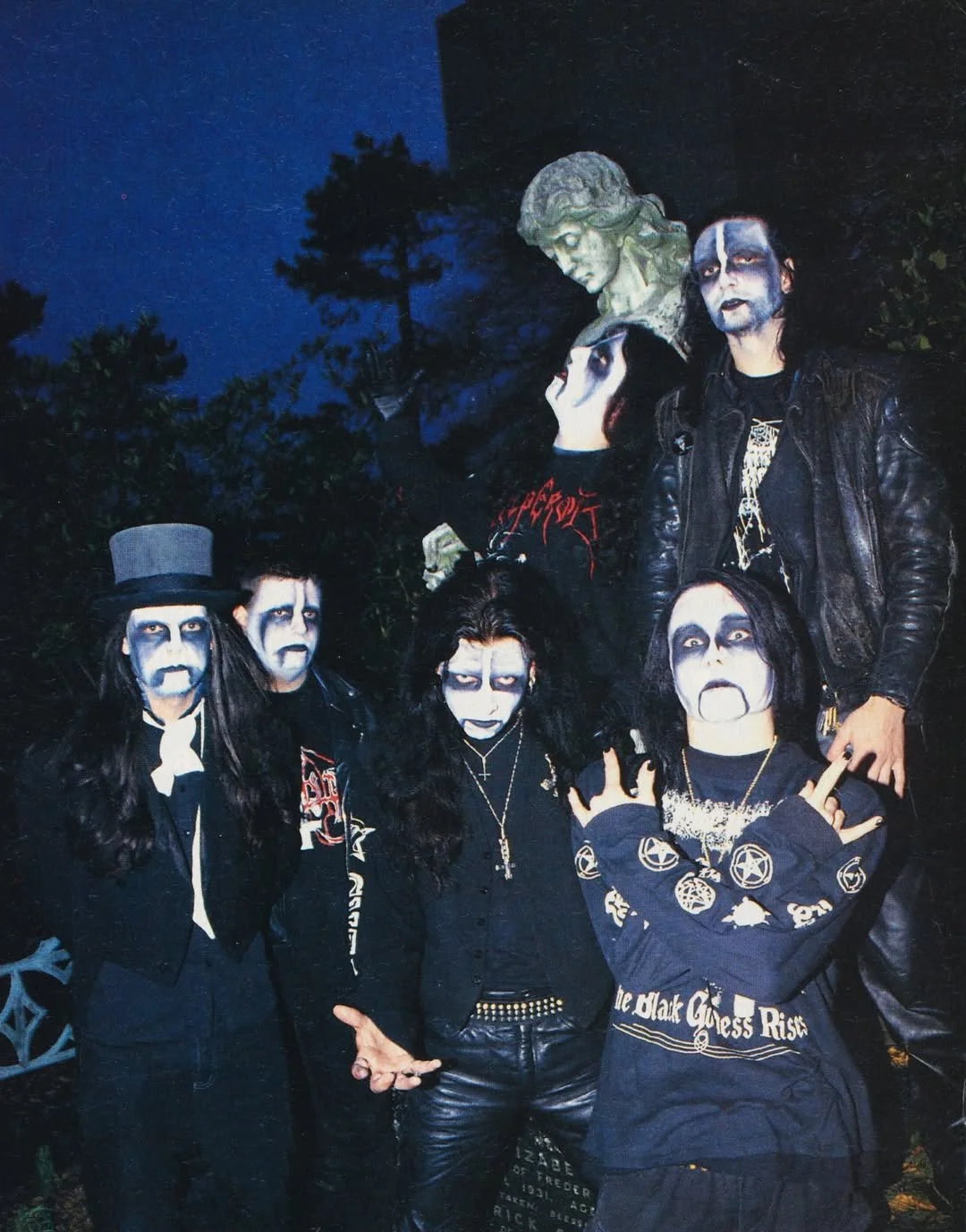
CRADLE
OF FILTH
———————————
PAUL RYAN
———————————
EXCLUSIVE INTERVIEW (2025)
———————————
Despite remaining hugely popular, and rightfully so, Cradle of Filth’s earliest studio recordings have remained curiously neglected in terms of rereleases or special editions over the last three decades. This has primarily been due to the long dormancy of their original label, Cacophonous Records, which, having thrived in the 1990s, mostly existed in name alone after the turn of the millennium, briefly resurfacing in the mid-2010s, only to mysteriously fall silent again shortly thereafter.
Now, finally, three iconic and hugely historically significant records are being reissued, namely the 1994 debut The Principle of Evil Made Flesh, the follow-up, Dusk and Her Embrace (The Original Sin), recorded in 1995 but shelved until 2016 after a re-recorded version was released in 1996, and Vempire, the 1996 EP/compilation that many consider a full album in all but name. Remastered and with much-expanded packaging, these iconic works are being issued on cassette, CD digibook and, of course, a range of vinyl editions thanks to German label Darkness Shall Rise.
We caught up with co-founder and original guitarist Paul Ryan, who played on both The Principle of Evil Made Flesh and Dusk and Her Embrace (The Original Sin), but importantly not Vempire, having left, along with his brother, keyboard player Ben Ryan, and guitarist Paul Allender, to instead form The Blood Divine in 1995. Since then, Paul has remained deeply involved in the music world, both creatively, through projects like Nine Covens, The King is Blind, and Mystical Forces, and professionally as a booking agent and promoter for major acts such as Cannibal Corpse, Paradise Lost, and even Sleep Token. We sat down for a lengthy conversation with Paul about various chapters of his career, beginning, of course, with a discussion of his time in Cradle of Filth.
The remastered reissues of the The Principle of Evil Made Flesh, Vempire and Dusk and Her Embrace (Original Sin) CDs and vinyl, as well as Cradle of Filth related books and merchandise are available at our main store HERE
Cult Never Dies: First of all, let’s talk about the reissues coming out this month. How is it to see those albums finally getting a proper rerelease after all these years?
Paul Ryan: “Very cool. Principle, especially, has become a milestone within the whole genre, and that to me is something I’m hugely proud of. I come across people all the time, industry-wise, and they’re like, ‘Oh, I love the old Cradle stuff – did you play on that record?’ I love that. That’s a real trip for me, still – always warms my heart. And the work itself has stood the test of time. I think there was a purity in terms of being young enough to be without any responsibility, and being around people for the passion and collective love of the music – there was a certain innocence to it, because I think there is a certain amount of vulnerability when you’re playing music. People don’t tend to look at it like that as such, but I think as a musician you are in a vulnerable position, and I think that’s why, if you put music out, especially if you put music out commercially, sometimes people don’t want to even look at the reviews and so on, because it’s something personal to you. But what comes with that, and I think particularly with the early Cradle stuff, is a certain magic. We were very much in tune with each other at the time, and it’s a very honest expression of how we were and what we were doing.”
Do you ever go back and listen to those two albums?
“I’m not someone who does nothing but listen to my own music. The opposite: I rehearse it and record it, and then once it’s done, for me, it’s always been almost like you’ve expelled it. It’s a bit different if you’re touring it all the time, because I think you get the enjoyment from physically playing the songs. But, for me, once I’ve gone to record something and it’s out there, then I don’t really listen to it again. So the times that I revisit stuff like Principle... or Dusk..., it’s always an interesting listen.”
How do you feel about that original version of the Dusk and Her Embrace album (ie. Dusk and Her Embrace (The Original Sin) in particular? Recorded in 1995 by yourself and the majority of the Principle of Evil... line-up, it is obviously quite different to the better-known version released in 1996. How do you feel they compare?
“It was a lovely experience to do The Original Sin, and it came around very organically with Dani and me and Neil (Frater Nihil of Cacophonous Records) connecting again after doing the Total Fucking Darkness release [on Nihil’s Mordgrimm label in 2014]. He was like, ‘I’ve got this original tape gathering dust’, and he was relaunching Cacophonous at the time, and Dani and I were like, ‘It would be really cool if that could come out.’ And the fact that it did come out, I think that’s pretty awesome, because it came full circle.”
“There’s also a certain amount of vindication, to be honest, because that’s how we wrote it originally to put out. And I don’t think the version that got put out [in 1996] is anything other than a masterpiece. I think the people around it did an incredible job. I’m never going to be the person to critique and go, ‘Oh, our version was much better.’ It’s not about that. I think they kept it true in spirit, and I know that Stuart [Anstis, Cradle guitarist from 1995 to 1999] always had a lot of nice things to say about my playing personally, and I would reciprocate that to say that Stuart’s playing was fantastic. I think the musicianship on it in general was top-notch. It’s still our music though – we wrote it.”
Obviously, your version of Dusk... was hidden from the rest of the world for a good 20 years, before being released in 2016, but another curious part of that story is that it then disappeared almost straight away as Cacophonous quickly stopped being active and didn’t repress the CDs or vinyl. That album was out of print again for almost another decade, despite having finally been released officially.
“Exactly. I was on at them, like ‘Why?’ Because the vinyl that they put out was brilliant. I don’t know how many copies it did – whatever they did on the vinyl and the digital, 15,000 or 20,000 maybe across all the bits and bobs, a decent amount – but it got done and then basically nothing else happened with it. So when I saw the German label sticking it out, I actually sent them a note and said, ‘I think this is really wicked, can I get some copies?’ And I had a really good bit of correspondence with them, as they said, ‘Sure, of course, whatever you want’.”
Is The Original Sin version exactly how you wanted Dusk and Her Embrace to be at the time? Was the recording totally finished before the band split in two?
“Completely. Yes, mixed, mastered, and everything. That was a more visceral version than what came out, I appreciate that, but that was how it was originally intended to be. And again, maybe things would have been different if that had come out versus the version that did come out.”
It’s just the drums that are the same on the two versions, right? They didn’t re-record the drums for the 1996 release I think?
“No, they didn’t re-record the drums. I think they just kept the drums and bits and bobs of what was there. There’s definitely some of my brother’s original keyboards on there, without a doubt. Because he recorded that with a very particular keyboard, The Emulator II. It was the first keyboard that used samples, it had a drive, like a floppy disk. If you want to geek out on it, Celtic Frost’s ‘Into the Crypt of Rays’, that sound at the start, that’s from The Emulator’s library. That is 100% from The Emulator. It was mono, it wasn’t stereo and had a very distinctive sound, which would have been very hard to recreate in any other way. Again, not taking anything away from Greg [Damien Gregori] or what he did – as I say, who am I to critique what turned out to be an absolutely phenomenal and seminal release? It’s more of an observation.”
The record also features a different bass player, with the late Jon Kennedy replacing a temporarily departed Robin Eaglestone.
“Yeah, obviously Robin rejoined, so he got to do [the version released in 1996]. And look, I think ultimately there was at the time... we did all fall out, we were much younger, and I think part of that was, ‘Yeah fuck them, we’ll re-record it,’ but whatever. I’ve booked the band, I’m still friends with Dani, I went to school with Dani and had no intention of ever not being friends with him. So I think these things are all a lesson, and I think that ultimately you go through that process, and you take something from it, and looking back on it, would people have done something different? If we had a conversation between us all now, I’m sure we’d have all done something different because we’re older and wiser and more philosophical about stuff. But when you’re in your late teens, early twenties, and completely absorbed within it and can’t see the wood for the trees... there’s a certain amount of passion that comes out of that where you don’t necessarily think about the consequences. But it’s all water under the bridge.”
Jon Kennedy left and rejoined Daemonum / Hecate Enthroned as their vocalist, fronting the band for the first three official releases – did you listen to those at all?
“Yeah, I think that was an interesting move. I mean, I lived with John, we lived with each other with my girlfriend at the time and his girlfriend at the time. And, we had some... he was a character. He was definitely a character. I found the pictures of us that you used [in the expanded Evolution of the Cult book, one example above] when we were doing the Total Fucking Darkness stuff, actually. We went round to my mum’s loft and found loads of stuff, and there’s still a lot of stuff up there which I haven’t looked through, to be honest, but I found an envelope with those pictures in it. I was like, ‘Oh, it’s me and John.’ Those pictures were taken in Colchester. We just went out one night after a few ciders and beers, and I think his girlfriend at the time would have taken those pictures. And I found those, and genuinely, I was going to try and get back in touch with him, then a week later, I got the news that he had passed away. Which really sends a bit of a shiver up my spine even saying it. I heard that and I was like, ‘What?’ I literally found those pictures after not seeing them for 20 odd years, a week before getting that news. But I’m glad that I found them, and it’s lovely that you’ve been able to use some of them in your publication.”
Thank you for that.
“No, no, it’s great to see them in print.”
It was, and perhaps still is, a topic of frequent discussion, but do you think Jon’s approach to his vocals were directly inspired by his time in Cradle of Filth? His efforts in that era certainly have a lot in common with Dani’s vocals at that time.
“Oh, 100 percent. We didn’t even know he could do any vocals – I lived with John for 18 months and I didn’t even know he could sing. And it’s quite a feat when you think about it, it’s not easy, a vocal style like Dani’s, it’s a bit like, ‘Good luck with that.’ He managed to do it pretty well, I mean, his vocals were great. And I think at the time, some people were a bit like, ‘Oh, they’re just copying Cradle’s work.’ But I don’t necessarily think that’s the case. I think that there were a lot of people being inspired by things at the time. If you look at how we wrote music, it was like, right, we’re going to ‘the Deicide riff’, and then we’ll follow that with ‘the Darkthrone riff’ and into ‘the Immortal riff.’ I think you take inspiration from other people in terms of styling – obviously, art influences art, doesn’t it? And I think part of the reason that the black metal scene and the death metal scene and the evolutions of all these scenes are so rich in output is because everyone’s listening to everyone else and getting driven on from it. I still see that now, working with the bands that I work with. Someone will set the bar with a record, and everyone will be like, ‘Holy fuck, that new record’s amazing.’ Everyone influences everyone, and that’s a healthy thing, I think. That’s one of the wonderful things about music: you get that synergy through it that inspires people.”
What does your brother Ben make of it all? He seems to have disappeared from the industry after playing keyboards for Cradle of Filth and The Blood Divine.
“I think he likes the nostalgic aspect of it. He’s just never had any time for... I think he still plays music personally, but he’s enjoyed being a family man and just having a quieter life, to be honest.”
I assume he knows all about the reissues, though?
“He knows about all of that, and he’s been involved in the background. He’s given me various pictures, and he’s given his blessing to it. His whole vibe on it is like, ‘If there’s the interest for it and people want to make it happen, I’m fully supportive of it.’ And he’s certainly supportive in anything that I do, but we’re quite different characters. My brother’s a lot more laid back than I am.”
Did you drag him into Cradle of Filth and a musical career in general, would you say?
“A little bit. He was playing keyboards at school. He was into a bit of metal, but he was massively into Jean-Michel Jarre, Jan Hammer and a lot of that stuff. When we were doing the first couple of demos, we were just obsessed with the death metal scene – also with the grind scene, but mainly death metal. That first Deicide album blew my mind; it’s still one of my favourite albums. It was such a vicious record, it’s still so visceral, and Benton’s vocals on there were just so fucking nasty. It’s still got a bite to it. I got that on tape actually; I was going on holiday with my parents, and we were driving down to Dover to go across on the ferry into Europe, and I got that on tape, I think, from Our Price in Dover. And we spent the whole two weeks just listening to nothing else, just being like, ‘Oh, this is just the most amazing thing ever.’ And we all had a very similar experience. Those first two [Cradle] demos were highly influenced by that particular record and a lot of the death metal that was going on, a lot of Florida death metal.”
“But then we got Always... by The Gathering, and that was a record that was particularly influential to us. It’s still phenomenal, but at the time, there was no one else doing that. In conjunction with all the black metal stuff happening, like the early Darkthrone albums, the Immortal albums.... with The Gathering and Paradise Lost in particular, we were like, ‘Right, we need to get some keyboards, because we want this textural element.’ My brother and I were obviously very close, and he’d got his first synthesiser, which was a Roland DX5, and so he was up for that. In fact, on the second Cradle demo, there’s one little breakdown part which is essentially the musical demo from his synthesiser.”
Do you regret now that the line-up on The Principle of Evil... and Dusk and Her Embrace (The Original Sin) didn’t stay together and create more recordings?
“I think that particular situation really highlights the people we had around us industry-wise, feeding into the passions of young people that didn’t know better, and there being a certain amount of manipulation with that. I think... how can I put it? I think if my life had turned out very differently, I might think differently. Music for me has always been a bit of a calling, and I was very fortunate to take the opportunities that were in front of me and transcend that into working in the industry, and have success within that, and still be working with the music that I love. So it’s not so much a case of regret. But I think it would have been super interesting to see how it would have continued.”
“I think that the blueprint is still there that we set, and that’s not taking anything away from what they do, but the blueprint, the signature sound of what Cradle do, ultimately comes from the time that we were in the band. And I say that Dusk... was the album that I think really set the blueprint up for where they went off to. And that’s not taking anything away from, say, Midian or Cruelty and the Beast, because they are really, really fantastic records. But, ultimately, I look at the blueprint of the construct of it as a musician, and the DNA of what we originally had is still very strongly in there. People have put their own touches to it, and made it their own to an extent, but the DNA is still very much running through the band. That is something that is flattering, that they stick to the signature sound that we helped create.”
Interview by Dayal Patterson.
The remastered reissues of the The Principle of Evil Made Flesh, Vempire and Dusk and Her Embrace (Original Sin) CDs and vinyl, as well as Cradle of Filth related books and merchandise are available at our main store HERE
Cradle of Filth are also interviewed at length in our book Black Metal: Evolution of the Cult – The Restored, Expanded and Definitive Edition.

